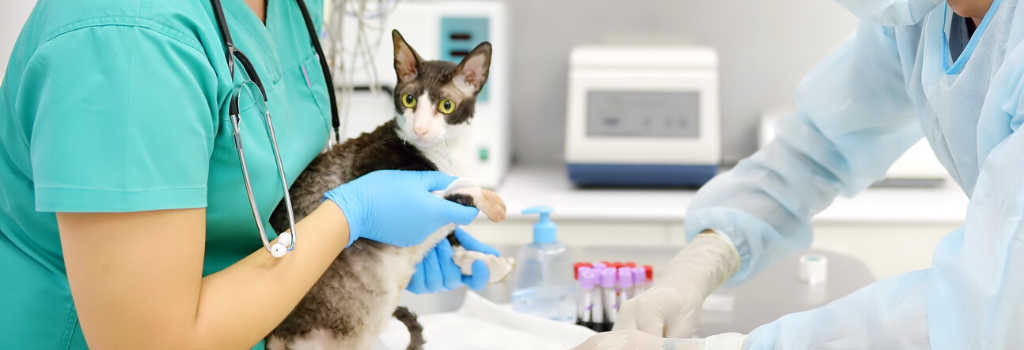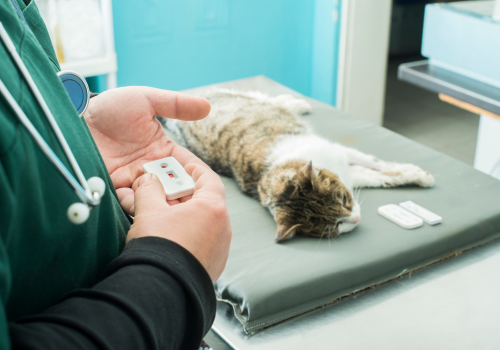Southwest Virginia Veterinary Services offers in-house laboratory testing as well as additional testing that can be sent to our outside referral laboratories. Laboratory testing is an essential part of your cat’s overall wellness, establishing a baseline for what is normal for your cat and allowing your veterinarian to detect issues early. Veterinarians use lab work combined with a physical exam and possibly imaging to paint a complete picture of what’s going on with your cat, leading to a proper diagnosis. If you’ve suspected something is wrong with your cat, you have come to the right place. At Southwest Virginia Veterinary Services, we work extremely hard to bring you the accurate information you need. We’ve taken the most frequently asked questions about cat lab work and answered them as thoroughly and accurately as possible, so you have information you can trust.
If you’re looking for a highly trained veterinarian in Lebanon, VA, we’d love to see your cat for baseline lab work, so please call us at (276) 265-8183.
What is lab work for a cat, and how is it done?
Lab work is essentially the same thing as blood work, which involves drawing a blood sample from your cat to help diagnose certain medical conditions. We most often draw it from the jugular vein, which runs just under the neck. Other times, your veterinarian may use a leg vein, a front leg vein, or a back leg vein, depending on what tests they’re running. The blood draw allows them to take your cat's blood sample and put it through an analyzer to compare it to normal values for a healthy cat. This is the primary way of detecting disease. Lab work sometimes involves a urine sample, which we can collect through a special cat litter or through a small gauge needle put into the cat’s bladder to retrieve a sample.
How does a baseline lab test impact the health and well-being of my cat?
Baseline lab tests give your veterinarian a critical reference for your cat, helping them understand what is normal for your particular pet. It’s essential to have this in their medical record if your cat becomes sick or we discover abnormalities. This is what makes an annual wellness visit so important – to see any ups or downs that would otherwise be unknown if your cat only goes to the veterinarian when they’re sick. Seeing subtle changes in lab work along the way can help detect illness and disease early when it’s more treatable and before symptoms make your cat uncomfortable. Baseline lab work is also essential when it comes to medications. If we need to start your cat on any medications, it’s good for your veterinarian to see the response through repeat lab work.
What are some reasons that my cat might need lab work done?
Cats need lab work for various reasons, the primary reason being wellness. Most veterinarians recommend yearly wellness exams that include lab work to give them a baseline and detect something wrong. Cats are excellent at hiding things and rarely show their owner when they're sick. Routine lab work might pick up on a problem that your cat has been hiding. We also do lab work to diagnose an illness once symptoms are showing.

Cat symptoms requiring lab work include:
- Vomiting
- Weight loss
- Diarrhea
- Gastrointestinal abnormalities
What are some possible cat health conditions that lab work can help detect?
Blood work involves three to four different procedures. One is a CBC, which assesses your cat’s red and white blood cell counts, looks at platelet counts, and looks at certain cells within the white blood cell count line. The other component is blood chemistry which looks at kidney function, liver function, protein levels related to pancreatic function, and often thyroid level. Finally, a urinalysis tells your veterinarian if bacteria are in your cat’s urine, red or white blood cells, or potentially crystals or other types of casts. In addition, there are other tests that your veterinary team can run to detect certain viruses.
Specific feline diseases that can we can detect with lab work include:
- Kidney failure
- Liver failure
- Heart disease
- Diabetes
- Thyroid disease
- Urinary tract infections
- Viral diseases such as feline immunodeficiency virus or leukemia virus
The Merck Veterinary Manual provides a comprehensive look at the various types of lab work, including what can be done in-house at a veterinary clinic and what must be sent out for evaluation by specialists.
What specific things are being looked at in my cat's blood work, and what can it tell my veterinarian about my cat's health?
On the most basic level, we should screen a new cat to your household for viral infections with blood work. Your veterinarian will look for feline leukemia and FIV — two highly contagious viruses from cat to cat.
There are three big categories when it comes to specific symptoms or diseases. One is the kidneys and blood urea nitrogen (BUN), the name for the kidney and creatinine. These are toxins that kidneys naturally filter out, but when they’re not working well, those toxins build up in the bloodstream, and we can detect them in routine lab work. Next is ALT and bilirubin focused on the liver, specifically a condition called hepatic lipidosis, with ALT being an enzyme that we can test for with lab work. Finally, diabetes in cats is common, so we routinely test blood sugar. One thing to not get too excited about is when the blood sugar is mildly elevated because a cat coming in to see their veterinarian often raises their blood sugar due to stress.
Electrolytes are often included in blood work—what are they, and what do you get from them?
If your cat is vomiting a lot, their electrolytes might be off. Your veterinarian will look specifically at the sodium chloride and potassium present, which helps determine the cat’s health.

Is blood work alone enough to ensure a proper diagnosis for my cat?
Veterinarians don't treat pets based on blood work alone. They believe in comprehensive physical exams, which means putting their hands on your cat and assessing them individually. Blood work provides a more complete picture to determine what's going on with your cat but isn’t the only consideration in a diagnosis.
With blood work, sometimes the machine is off, or the sample is hemolyzed, which means it's not the perfect sample or some breakdown has occurred — reinforcing the importance of assessing the cat as well as the lab results. It’s also possible to see sick cats with normal blood work. That's why it's essential to do a good physical exam, as a veterinarian using their hands is often better than tests in determining what’s going on. Other times, we might need imaging such as an x-ray or ultrasound in addition to a physical exam and lab work.
Why is early detection and diagnosis of an illness using lab work so important?
Early detection and diagnosis are especially critical for cats because cats hide things. It's their survival mechanism, so early detection is vital because that carries a better prognosis. Once symptoms are showing, the disease has progressed considerably. When we catch an issue early, we can start treatment immediately and save your cat the pain and discomfort of symptoms.
If you have further questions about cat lab work, reach out to your veterinarian. If you live in or near Lebanon, VA, we’d love to see your cat for a wellness exam and routine lab work, so please don’t hesitate to call us at (276) 265-8183 or email us at [email protected].

